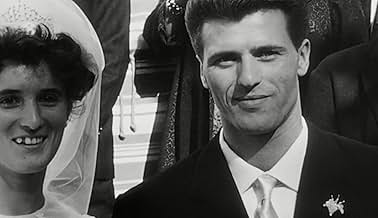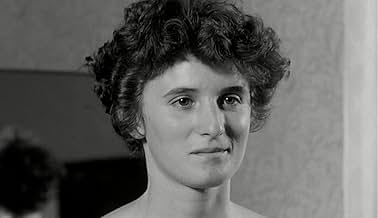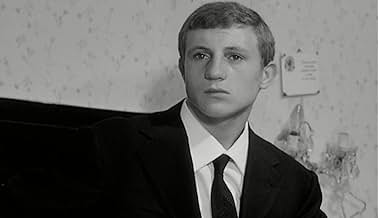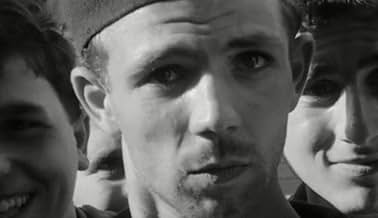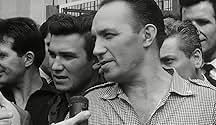NOTE IMDb
7,5/10
2,8 k
MA NOTE
Ajouter une intrigue dans votre langueDirector Pasolini traverses Italy in 1963 with camera and microphone interviewing people in public places about sex, marriage and gender roles.Director Pasolini traverses Italy in 1963 with camera and microphone interviewing people in public places about sex, marriage and gender roles.Director Pasolini traverses Italy in 1963 with camera and microphone interviewing people in public places about sex, marriage and gender roles.
Lello Bersani
- Narrator
- (voix)
Io Appolloni
- Self - Girl at Lido with Swimming Cap
- (non crédité)
Graziella Chiarcossi
- Graziella the Bride
- (non crédité)
Graziella Granata
- Self - Girl at Lido with Long Hair
- (non crédité)
Pier Paolo Pasolini
- Self - Interviewer
- (non crédité)
Avis à la une
I too was disappointed, but not for the reasons cited in the previous comment.
Instead, I found the film very hard to follow, with lots of academic buzzwords (interviewer Pasolini refers to "the sex problem" at least 20 times), not all of it subtitled, and subtitles that faded out of legibility against light backgrounds.
The movie was visually unappetizing, in part because of inconsistent and often inept camera work, and in part because of a sloppy transfer to tape that washed out the middle tones and often made it hard to see and read people's faces.
The most annoying element was the recurrent muting of the voice tracks (and of course the accompanying sub-titles) that was labeled "self-censorship." Was this a comment on official censorship of the time? I get the impression that the most interesting answers were lost to the audience through this process.
An interesting and meaty idea from a provocative and often great filmmaker, undercut by directorial inexperience and poor repackaging.
Instead, I found the film very hard to follow, with lots of academic buzzwords (interviewer Pasolini refers to "the sex problem" at least 20 times), not all of it subtitled, and subtitles that faded out of legibility against light backgrounds.
The movie was visually unappetizing, in part because of inconsistent and often inept camera work, and in part because of a sloppy transfer to tape that washed out the middle tones and often made it hard to see and read people's faces.
The most annoying element was the recurrent muting of the voice tracks (and of course the accompanying sub-titles) that was labeled "self-censorship." Was this a comment on official censorship of the time? I get the impression that the most interesting answers were lost to the audience through this process.
An interesting and meaty idea from a provocative and often great filmmaker, undercut by directorial inexperience and poor repackaging.
At first sigh, social portrait. Pier Paolo Pasolini across Italy , talking with large categories of people about not very comfortable themes. Their answers, the crowd, the familiar names from Antonella Lualdi and Oriana Falacci to Alberto Moravia, Cesare Musatti or Giuseppe Ungaretti interventions and the answers, genuine, innocent, in few cases hypocritics of people and the discover of powerful tradition defining rules of life, the difference, real profound, betwen South and North of Italy, the silence of middle class , the laws and the essence of a special world. Sure, in my case, the name of director/ interwiever was the basic/ fundamental kick for not ignore this documentary. The prize - the high honesty, the humor, smiles, reactions, laugh, shame, reactions, the manner to explore the one front of him by Pasolini, the crumbs of nostalgia, the memories about pasolinian textes. So, a large slice of life, provocative, in same measure, yesterday and today and, in my case, just fascinating.
Pasolini filmed this documentary in 1963, looking for an account of sexual life in Italy at a turning point in history. He travels south and north, to towns and countryside, interviewing intellectuals, workers, farmers and kids. The result is a strikingly accurate portrait of diversities in the country, and of inhibitions and problems to talk about a "natural" thing. Between the notable people interviewed, Nobel prize poet Ungaretti, writers Moravia, Cederna, Fallaci, a whole professional football team, and more.
What stroke me more is the great journalistic pace of the documentary, the technique of intermixing different areas of the country, a very clever approach. A great work still "modern" nowadays.
Sadly amusing the part where Pasolini (an homosexual himself) asked common people an opinion about homosexuality receiving answers of total denigration.
What stroke me more is the great journalistic pace of the documentary, the technique of intermixing different areas of the country, a very clever approach. A great work still "modern" nowadays.
Sadly amusing the part where Pasolini (an homosexual himself) asked common people an opinion about homosexuality receiving answers of total denigration.
In this documentary, Pasolini travels around Italy and interviews random people in public places about their attitudes towards sexuality, marriage, and gender issues. It's fascinating to hear how Italians in the early 1960s felt about these topics, and there are plenty of opinions that seem shocking from a modern perspective. There are people who think that divorce should be illegal (they'd rather have spouses kill each other), parents who find it perfectly normal for 14 year-old boys to lose their virginity with a prostitute, and women who think it's only right that they have less rights and freedoms than men. It's especially interesting to hear the interviewees confess their unabashed disgust towards homosexuals to the secretly gay director.
However, I can't help but wonder if it wouldn't have been more interesting to include some interviews that weren't conducted in public places with groups of people standing around. As it stands, the movie gets a bit repetitive after a while and probably would have been more effective with a shorter running time.
However, I can't help but wonder if it wouldn't have been more interesting to include some interviews that weren't conducted in public places with groups of people standing around. As it stands, the movie gets a bit repetitive after a while and probably would have been more effective with a shorter running time.
Amid some unsurprising considerations from major italian popular figures of the time, Pasolini publicly asks questions related to sex, ethics, sociology and politics to those bold and naive enough to attempt an answer.
The value of such an endevour - wether it is hundreds or hundreds of thounsands of interviews - is (admittedly by the author) debatable at best except for some - nowadays obvious - sociological observations.
Fortunately Pasolini closes (and saves) the film with a greatly poetic final 3 minutes section that feels like a wrap up of the "results" of his inquiry:
"Do men care about anything but living life? A couple getting married. They don't know anything about their love. Life is merciless the most when it is happy and innocent. The knowledge of what's good or evil lies ahead of this forgetfulness of those busy living. And those knowing don't talk in front of such a grace unwilling to learn. But this silence is criminal."
IMHO the movie is in this aphorism. While never boring the interviews are not really interesting (let alone sociologically relevant) either. The documentary was released rated for 18yo: a side note that again summarizes the point we can make today out of it.
Fortunately Pasolini closes (and saves) the film with a greatly poetic final 3 minutes section that feels like a wrap up of the "results" of his inquiry:
"Do men care about anything but living life? A couple getting married. They don't know anything about their love. Life is merciless the most when it is happy and innocent. The knowledge of what's good or evil lies ahead of this forgetfulness of those busy living. And those knowing don't talk in front of such a grace unwilling to learn. But this silence is criminal."
IMHO the movie is in this aphorism. While never boring the interviews are not really interesting (let alone sociologically relevant) either. The documentary was released rated for 18yo: a side note that again summarizes the point we can make today out of it.
Le saviez-vous
- ConnexionsEdited into Lo schermo a tre punte (1995)
Meilleurs choix
Connectez-vous pour évaluer et suivre la liste de favoris afin de recevoir des recommandations personnalisées
- How long is Love Meetings?Alimenté par Alexa
Détails
Box-office
- Montant brut mondial
- 2 789 $US
- Durée1 heure 32 minutes
- Couleur
- Mixage
- Rapport de forme
- 1.85 : 1
Contribuer à cette page
Suggérer une modification ou ajouter du contenu manquant

Lacune principale
By what name was Enquête sur la sexualité (1964) officially released in India in English?
Répondre

